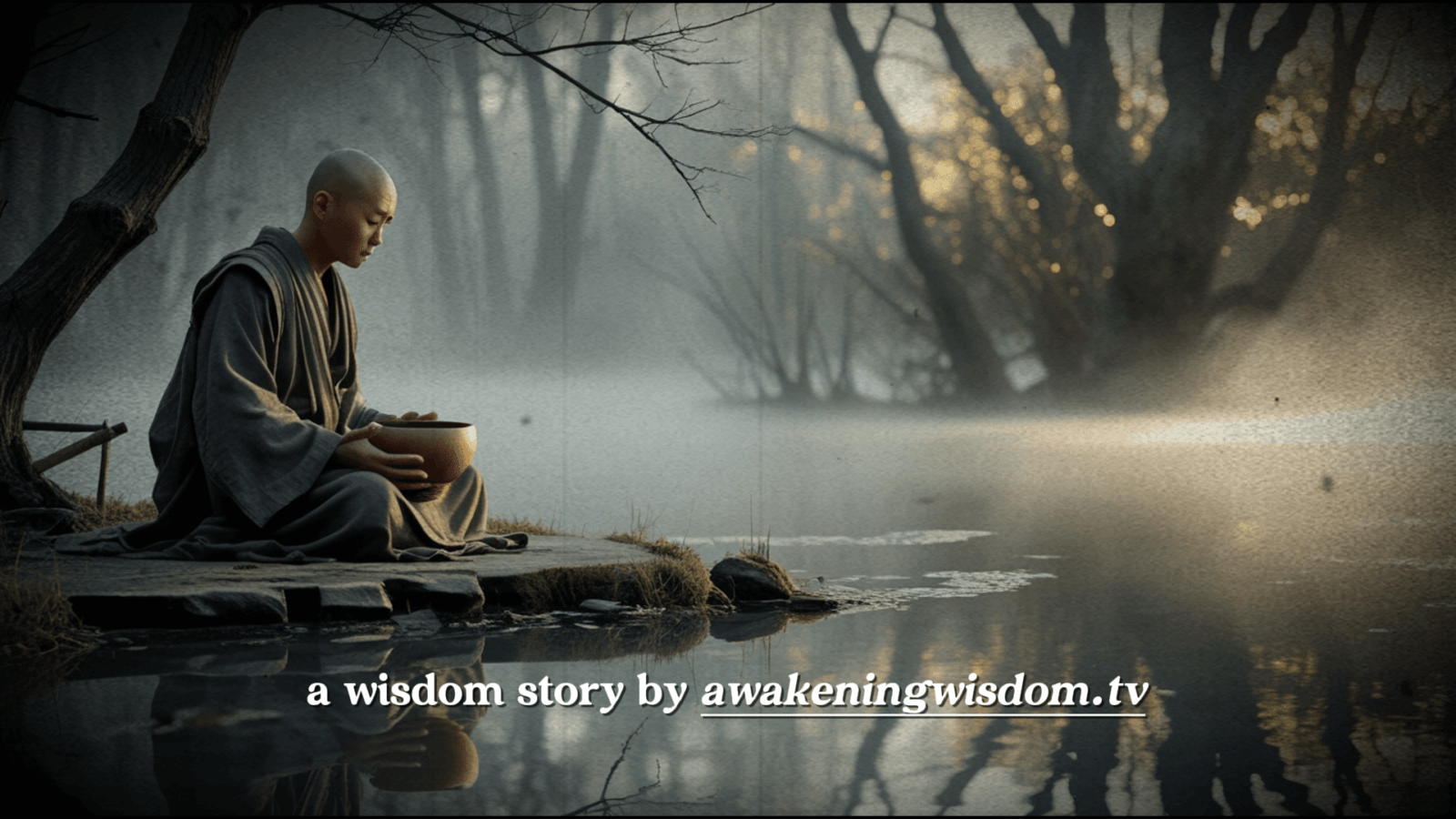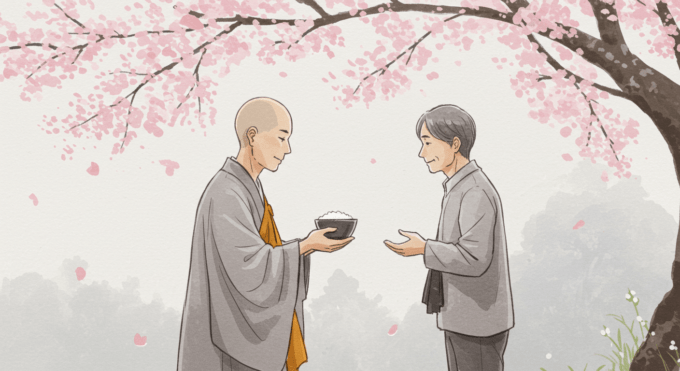How Embracing Emptiness Began with a Monk
Long ago, in a quiet valley cradled by misty mountains, lived a monk named Koji. His days unfolded simply, walking the forest paths with a wooden bowl, seeking alms from villagers. One autumn morning, Koji stood at the edge of a bustling market, his bowl empty as the wind rustled his tattered robe. Embracing emptiness stirred within him, a whisper amid the clamor of hawkers and carts.
Villagers passed him by. Some dropped rice, others coins, but most ignored him, their arms laden with goods. A merchant shouted, “Fill your life with wealth!” A farmer grumbled, “Work hard or starve.” Their voices pressed against Koji, urging him to chase more. Yet, he stood still, feeling the bowl’s lightness. Once, he too had craved fullness, hoarding scraps and trinkets. Now, though, that whisper grew clearer, asking him to let go instead.
When Koji Chose the Empty Path
The sun dipped low that day. Koji returned to his hut, his bowl holding only a few grains. Rather than despair, he smiled faintly and set it by the door. He sat on the dirt floor, watching shadows stretch across the room. Embracing emptiness wasn’t about lack, he realized; it was about space.
Next morning, a storm swept through the valley. Rain battered the market, scattering wares and soaking the villagers. Koji stepped outside, bowl in hand, and walked into the downpour. Others ran for shelter, but he sat beneath a gnarled pine, letting water drip from his hood. A child approached, shivering, and asked, “Why don’t you seek cover?” Koji lifted his empty bowl. “This holds the rain,” he said. The child frowned, then laughed as water splashed inside. Soon, Koji gave the bowl to the child to drink from, and they sat together, unbothered by the storm’s roar.
Word spread of the monk who faced the tempest. Curious villagers came, offering rice and cloth. Koji accepted only what he needed, returning the rest with a bow. “Why refuse more?” they asked. He pointed to his empty hands, serene.
The Day Embracing Emptiness Shone Bright
Weeks turned into months, and a fierce drought gripped the valley. Rivers dwindled to trickles, crops shriveled under a relentless sun, and the market fell eerily silent. Villagers clutched their last scraps of food, their faces etched with worry and fear. Koji, however, continued his quiet walks, his bowl as empty as the parched earth beneath his sandals. One evening, as the sky burned orange, a weary woman approached him near the dry riverbed. Her hands trembled, clutching a wilted bundle of greens. “We’re starving,” she said, her voice cracking. “What good is your emptiness now?” Koji paused, then knelt, gently placing his bowl on the cracked ground.
He rose without a word and wandered into the forest, gathering fallen branches and dry twigs. Returning to the riverbed, he built a small fire, its flames flickering weakly against the twilight. He beckoned the woman to sit, and soon others drifted over, drawn by the faint glow and the promise of warmth. Because his bowl held nothing, Koji looked to them, asking softly, “What do you carry?” Hesitant at first, they began to share: a handful of rice from one, a bruised root from another, a few dried berries from a child’s pocket. Together, they placed their offerings into the bowl, and Koji stirred them over the fire with a borrowed stick. The air filled with a humble scent, earthy and warm, as a thin stew took shape.
The woman took a sip, her eyes widening. “This tastes like plenty,” she whispered, tears spilling down her dusty cheeks. Another villager, an old man with gnarled hands, nodded as he ate, his shoulders easing for the first time in weeks. By morning, more came, their steps tentative but hopeful. They brought what little they could spare, a pinch of grain, a shriveled herb, and the bowl overflowed with their collective trust. Children laughed as they scooped handfuls, their voices cutting through the stillness like a forgotten song. The fire crackled late into the night, a beacon in the barren valley, and Koji watched, his face calm, as emptiness became a shared feast.
Facing the Weight of Wanting
Embracing emptiness had turned scarcity into something abundant, a quiet miracle born from letting go. That night, the valley didn’t just eat, it breathed anew, sustained by a bowl that held nothing and everything.
Peace didn’t come without struggle. Some nights, Koji’s stomach growled, and memories of his old life crept in. He recalled a time when he’d clutched a sack of rice, fearing its loss, only to find it rotted from his grip. Now, as the drought lingered, doubt flickered. Villagers sometimes mocked him, calling his emptiness foolish.
One dusk, a rich trader stopped by Koji’s hut, his cart brimming with goods. “Take this gold,” he offered, “and live better.” Koji looked at the shining coins, temptation tugging at him. However, he shook his head, placing his empty bowl between them. “This holds what I need,” he said. The trader scoffed and left, but Koji sat by his door, breathing the cool air. Later, he found a single coin on the path, enough for a meal, and smiled. Embracing emptiness meant trusting the moment, not grasping for more.
Why Embracing Emptiness Fills the Heart
Years passed, and the valley changed. Rain returned, crops grew, yet Koji remained the same, walking with his bowl. Villagers began to sit with him, not for food, but for the quiet he carried. When he grew old, a young monk asked, “What did emptiness give you?” Koji lifted his bowl, still bare, and said, “Room for everything.”
Reflecting on his life, Koji saw the truth. The merchant sought wealth, the farmer chased toil, but their fullness left them heavy. Embracing emptiness gave Koji lightness, a space where others could rest. Now, his legacy wasn’t gold, but the calm he shared. The lesson shines simply: letting go creates abundance. When you stop filling, you receive. That’s the gift of embracing emptiness: it offers freedom, not want. So, when the world pushes, pause. An empty bowl might hold the sky.









Leave a comment